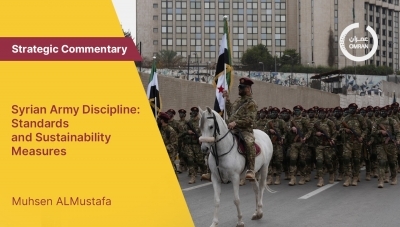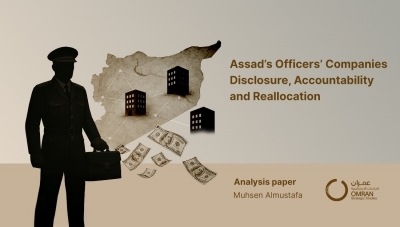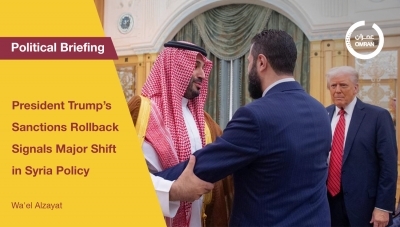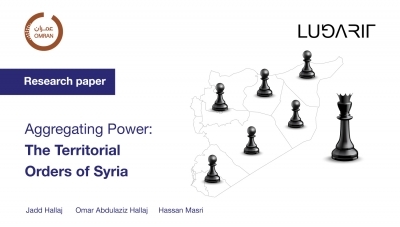Omran News
Safe Environment as a Precondition for the Return of Refugees and the Internally Displaced
- Introduction
Forced migration and internal displacement is still the heaviest toll of Syria’s security deterioration. The main political actors continue to struggle with resolving the causes of migration, including absence of security, empowerment, interaction, and safe spaces.
There are a host of challenges including the inability to provide basic services for IDPs and the lack of political coordination between local and international actors to maintain policies and procedures that lead to “dignified and voluntary return”. The local security actors, in turn, have no supporting strategies whether due to threats and challenges or the negative role they play within recovery and development prospects.
Stability is associated with the effectiveness of “local security” structures, which are deeply affected – structurally and functionally – by several governance models and performance, this association significantly affects refugees and IDPs return. This paper investigates indicators of a safe environment as a necessary condition for stability, return of refugees and IDPs and the prevention of further conflicts. This research attempted to raise questions and insights related to existing security structures, the Assad regime and its allies’ in-depth attitude towards such an environment, and finally, broad visions of a safe environment in the Syrian context.
This paper can be regarded as a thematic summary of an in-depth and comprehensive research initiated by Omran Center in the beginning of 2020. The research aimed at exploring several facets of the issue, first facet deals with refugees’ and IDPs’ prospect of return and related security issues. Second facet is related to the concept of relationship between civil society and security structures, as this relationship defines the legal and organizational parameter of a stable and secure environment. The third facet focuses on security indicators that affect people’s daily life, such as explosions, abductions, assassinations, etc. To examine the regime’s approach and attitudes towards national interest, the research was based on two focus groups located in areas the regime gained after 2018.
For More Click Here: https://bit.ly/3nxBki8
An Assessment of Civil-Military Relations in Syria
- Introduction
The majority of literature discussing civil-military relationship highlight that armed forces must follow a democratic civilian leadership. To achieve such a relationship, a state must undergo a complicated process to meet the necessary requirements, including a comprehensive legislative reform, a change in the entire security sector, the inclusion of transitional justice, establishing democratic institutions, and instilling democratic values. Civil-military relations are the most sensitive and vital aspect of the democratic transformation process, as failure to address the complex relationship may result in a relapse to the pre-democratic authoritarian status. An essential component to establishing democratic transportation, civil-military relations is a key element affecting internally displaces persons (IDPs) and refugee return, as well as their engagement in political, social, and economical life.
The necessity to secure a safe environment for dignified and voluntary return is intertwined with promoting civil-military relations. Such an environment does not currently exist across Syria’s geography, as various actors struggle to attain more power. The absence of a future plan that entails a “new political era,” and the “cautious freeze” on the ground, has resulted in a multitude of governance models backed by the various international and regional powers. This paper seeks to delve into civil-military relations throughout Syria’s geography, which consists of numerous governance models, to assess the impact of those relations on a refugee and IDP return. The ultimate research question addressed; to what extent do civil-military relations affect refugee and IDP decision to return?
Although the study sheds light on civil-military relations in all areas of control, there is a particular focus on regime-held areas. Regime-controlled areas provide identifiable features concerning civil-military relations, as the regime has control over the state in legal and institutional terms. Additionally, the regime’s security approach will have the most impact on civil-military relations in the future, affecting more than 12 million displaced Syrians decision to return. The paper also sheds some light on such parameters in areas outside regime control as fragile stability in others zones also hinders the formation of a safe environment conducive of a voluntary and safe return.
For More Click Here:https://bit.ly/2WjwWHv
Palestinians of Syria.. Violation of Rights and Identity Challenges
Executive Summary
- Palestinian refugees in Syria have not been spared from the relentless violent policies of the Syrian regime. Gross violations have been committed against them, and they have experienced a rapid erosion of the rights afforded to them by both Syrian and international law. As of October 2019, documentation indicates that 3,995 Palestinian refugees in Syria—mostly young men—have been killed and 1,768 Palestinian refugees have been detained in the regime’s security and intelligence prisons. More than 568 Palestinian detainees of the victims, both male and female, have been tortured to death in regime detention. In addition, there have been 205 casualties who died due to starvation, lack of medical care, siege, and the semi-complete destruction of the Palestinian refugee camps of Daraa, Sbeineh, al-Sayida Zainab, and Handarat; the destruction of large parts of the camps in Khan al-Sheih and al-Husseinyeh; and the complete destruction of al-Yarmouk camp. Furthermore, more than 200,000 Palestinians have fled across the Syrian borders.
- Palestinian refugees in Syria have suffered and continue to suffer from intense threats and risks to their real property rights. Some of the Syrian laws issued in recent years provide cover for the government to strip owners of their own property. In addition, the tight security grip prevents the return of refugees and internally displaced persons (IDPs) to their original homes in the Palestinian camps. As a result, Palestinian refugees in Syria have experienced large-scale property expropriation for political purposes. At the same time, the USA and European countries still refuse to participate in the reconstruction of Syria until a political solution is reached and the United Nations Relief and Works Agency for Palestine Refugees in the Near East (UNRWA) is failing to shoulder the burden of rebuilding Palestinian camps due to its financial deficit and challenges to its very mandate.
- The relationship between UNRWA and the General Administration for Palestinian Arab Refugees (GAPAR) was governed by the checks and controls through which the Syrian authorities specified UNRWA’s role and the its geographical scope of work in Palestinian camps and communities. As a result of these restrictions and controls, UNRWA’s services have failed to reach the large number of refugees who need them, depriving thousands of refugees from the services and aid.
- Challenges facing the continuation of UNRWA’s mandate cannot be separated from the legal status of refugees, as UNRWA maintains the comprehensive civil record of the refugee assets in Palestine. This is considered the primary archive of transformations in their demographic status and a crucial source for confirming the international legal dimensions of their asylum.
- During the recent turmoil in Syria, the Palestine Liberation Organization’s (PLO) declared position of political neutrality towards the Syrian issue did nothing to prevent a series of marked violations of the civil rights of refugees. A profound shift in refugees’ perception of the PLO can be observed by looking at the positions of PLO’s leadership at various milestones in the conflict. Positions issued by PLO leaders contributed to covering up responsibility for the parties involve in such crimes as indiscriminate bombardment, siege, starvation, and detention of people in al-Yarmouk camp. Meanwhile, Palestinian factions loyal to the regime such as the Popular Front for the Liberation of Palestine – General Command, As-Sa’iqa, Fatah al-Intifada, Jabhat al-Nidal al-Sha'bi, and other militias, in addition to the Palestine Liberation Army, all participated in fighting alongside the regime and helped it impose the siege on al-Yarmouk camp.
- This research reveals the magnitude of the complex problems faced by Palestinian refugees in Syria by examining the paths of their migration and escape from the bloody war—which Palestinians in Syria lived through as their second catastrophe, or “Nakba”—and the crises and violations they have faced in neighboring countries and other places of exile. The failure of many States to comply with the 1951 Refugee Convention has magnified the suffering of refugees by denying them protection and aid, leaving them with limited options. As a result, many have found themselves and deprived of their rights and at risk of deportation and refoulement. This research presents various examples of the violations that Palestinian refugees have been exposed to due to their vulnerable legal status, such as: being detained in airports and holding centers for foreigners for long periods of time; being deported back to Syria or the threat thereof; being treated as foreigners or tourists rather than refugees fleeing a war; not being offered humanitarian assistance that would mitigate their suffering; etc.
- The risks and challenges facing the “Palestinian-Syrian identity” highlight the extent to which legal status and its transformations impact the holders of this identity. They face difficulties rebuilding and restoring their identity, not only in terms of place and collective memory, but also in terms of the disintegration of their legal status. This reveals a recognition of the importance of legal status and its implications for the configuration of identity and its open questions. It is especially so with the ambiguity of the future in Syria in general, and of options related to the legal status of Palestinians in Syria, in particular, opening the floor for multiple risks and challenges putting much doubt and posing major questions to the identity dialectic.
- One of the most important recommendations stemming from this research is to expose the Syrian authorities’ responsibility for the degradation of the legal status of the Palestinians of Syria. There should be a shift from monitoring and documenting violations to encouraging victims of these violations to take their cases to court in countries whose national laws allow for universal jurisdiction in such cases where the perpetrators committed war crimes and crimes against humanity. The research further recommends the formation of a special committee or commission to advocate for the property of Palestinian refugees in Syria and calls on all host countries and bodies concerned with managing the affairs of Palestinians of Syria to grant them their right of confirming their original Palestinian citizenship in all documents, records, and data. The findings demand that the PLO address the adverse effects of the lack of representation of refugees and urges the PLO to set up institutional mechanisms to unite the diaspora and represent their demands and rights. The research also emphasizes the importance of the persistence of UNRWA, the continuation of its foundational assistance mandate, and the exposure of schemes aimed at eliminating the cause of the refugees and eradicating their right of return to their homeland in Palestine as per UN General Assembly Resolution 194 (III).
- In light of the magnitude of issues facing Palestinians in Syria, including the disintegration of their legal status, the continued attrition of their presence inside Syria, and the difficulties faced by those forced to migrate and flee to other countries, all attempts to remedy and restore their status will depend on the course of and end to the conflict in Syria. There appear to be few current approaches or solutions that may reassure Palestinians about the future of their presence in Syria and move them towards a more secure legal status that guarantee their rights.




